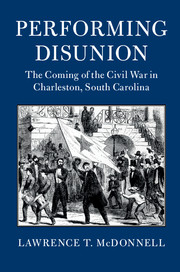CRISIS: FIRE AND SWORD
Published online by Cambridge University Press: 08 June 2018
Summary
Is not most soldiering a form of make- believe, but done so seriously, that we come to believe our unnatural roles, and are ready to turn play- acting into reality? We have been rehearsing for so long it is difficult to believe in the reality.
Neil McCallum, Journey with a PistolWhat forces kindle revolution and move men to war? Among the higher echelons, hopes and ideals may inspire. But revolution and war are not made, ultimately, by generals, politicians, and prophets. They are set in motion by ordinary young men mostly, performing simple, practical acts at street level: choosing sides, suiting up, planting flags, killing. 2 With regard to the Peloponnesian conflict, Thucydides explained what military historians call initial motivation in three blunt words: fear, honor, and interest. Twenty centuries later, on the eve of another equally disastrous civil war, Walter Steele echoed the Greek's analysis, triangulating in his potent local vernacular: “Politics! Chess! Hats!!!”
Just so: in Charleston on the eve of disunion, politics was a kind of theatre, focused on fear; chess a species of commerce, trading in honor and its clashing cousin respectability; hats signified a form of homosocial play and assertion, rooted in self- interest. Each tangled up with the others, spinning out different trajectories of allusions and appearances. Separately and collectively, those signs held special resonance for particular Charlestonians: men of certain social characteristics and peculiar personal experience. The fellows who rallied to Sam Tupper's call in 1860, forming the Vigilant Rifles, were perhaps more attuned than most to the hidden meanings of codes, gambits, and allusions that permeated Steele's symbols. They knew better how to discover clues in that web of connotations, treacherous though they often were. When they smelled smoke, they knew enough to look for fire.
Who were these Minute Men? By Tupper's account they were “men accustomed to dangers and fatigue,” who had “equipped themselves at their own expense,” though most were far from wealthy, and only a few owned slaves. They possessed little military experience as volunteer or line militiamen, yet most had stood ready to face “a fiery ordeal” more daunting on a daily basis.
- Type
- Chapter
- Information
- Performing DisunionThe Coming of the Civil War in Charleston, South Carolina, pp. 323 - 324Publisher: Cambridge University PressPrint publication year: 2018



